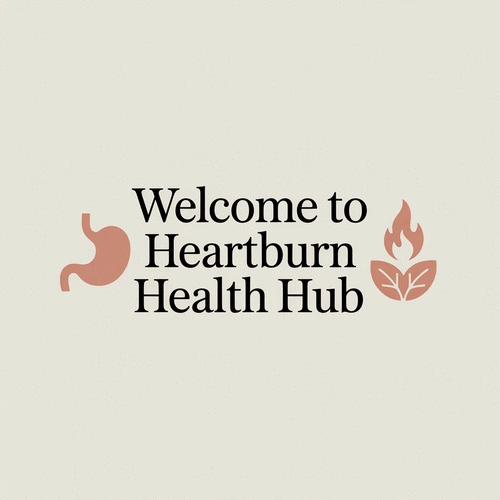Understanding heartburn is not just about managing discomfort; it's about empowering yourself with knowledge. With millions experiencing this condition, knowing how to recognize and address heartburn can make a significant difference in your quality of life.
What You Will Learn
- Heartburn is a symptom of acid reflux, not a standalone disease.
- Frequent heartburn may indicate GERD, a chronic condition requiring medical attention.
- Common triggers include spicy foods, caffeine, and overeating, which can exacerbate symptoms.
- Long-term management involves dietary changes, smart snacking, and hydration to reduce flare-ups.
- Probiotics and herbal remedies, like ginger and chamomile tea, can support digestive health.
- Consult a healthcare provider if symptoms occur more than twice a week or worsen over time.
Heartburn vs. GERD: Key Distinctions and Triggers
Understanding the difference between occasional heartburn and the chronic condition of GERD is crucial for effective management. Below is a comparison of their characteristics and common triggers.
Heartburn: Occasional Symptom
- • Occasional symptoms
- • Triggered by specific foods/habits
- • Treatable with OTC remedies
A common discomfort, often manageable with simple changes.
GERD: Chronic Condition
- • Frequent symptoms (2+ times/week)
- • May require long-term management
- • May require prescription meds/lifestyle
A more persistent issue, often needing medical intervention.
Common Triggers & Risk Factors
Understanding Heartburn and GERD: A Guide to Symptoms and Implications

Heartburn is a common condition that many people encounter at some point in their lives. It often presents as a burning sensation in the chest, sometimes accompanied by a sour taste in the mouth. Understanding what heartburn is and how it manifests can help you identify when you’re experiencing it. It typically occurs when stomach acid flows back into the esophagus, the tube connecting your throat to your stomach. This reflux can happen for various reasons, and while the sensation can be uncomfortable, it’s important to recognize it as a warning sign from your body.
To delve deeper into this, consider how heartburn can affect your daily life. Have you ever felt that uncomfortable tightness after enjoying a favorite meal? It’s not just about discomfort; frequent heartburn can impact your overall well-being. At Heartburn Health Hub, we aim to empower you with the knowledge to recognize and address these symptoms effectively.
What is Heartburn and How Does It Manifest?
When we talk about heartburn, we are referring to the symptom rather than a disease itself. It can be described as a burning feeling that rises from the stomach, often into the chest, and even up to the throat. This sensation is caused by acid reflux, where stomach acid irritates the lining of the esophagus. You might notice that certain foods or activities trigger this burning sensation. Here’s what to look out for:
- Burning feeling in the chest after eating
- Discomfort when lying down or bending over
- Acidic taste in the mouth
Being aware of these manifestations can help you manage heartburn more effectively. But remember, the way heartburn presents itself can differ from person to person.
Distinguishing Between Heartburn and GERD: Key Differences
Heartburn is often confused with Gastroesophageal Reflux Disease (GERD), but they are not the same. While heartburn is a symptom, GERD is a chronic condition characterized by frequent acid reflux. If you experience heartburn more than twice a week, it might be time to consult a healthcare professional. For further details on managing GERD through diet, the National Institute of Diabetes and Digestive and Kidney Diseases provides valuable information on how diet and nutrition play a key role. Here are some distinctions:
- Heartburn: Occasional symptoms triggered by specific foods or habits
- GERD: Frequent symptoms that may require long-term management
- Heartburn: Can usually be treated with over-the-counter remedies
- GERD: May require prescription medications or lifestyle adjustments
Understanding these differences is crucial, as it can guide your treatment options and when to seek medical advice.
Common Symptoms and When to Seek Medical Advice
Beyond the burning sensation, there are several other symptoms associated with heartburn. These can help you determine if it’s time to reach out for professional guidance. Common symptoms include:
- Chest pain that mimics heart-related issues
- Difficulty swallowing
- Chronic cough or sore throat
- Regurgitation of food or sour liquid
If you experience any of these symptoms frequently, especially alongside any severe chest pain, it’s essential to contact your healthcare provider. At Heartburn Health Hub, we emphasize the importance of listening to your body and knowing when to seek help.
The Role of Acid Reflux in Heartburn: Understanding the Connection
Acid reflux is the underlying cause of heartburn. It occurs when the lower esophageal sphincter (LES) doesn't close properly, allowing stomach acid to escape into the esophagus. This process can lead to inflammation and contribute to the sensation of heartburn. Understanding this connection can aid in managing your symptoms more effectively. For expert insights on how good nutrition is key to managing GERD, the Academy of Nutrition and Dietetics offers valuable resources. Here are some factors that can exacerbate acid reflux:
- Overeating or eating large meals
- Spicy or fatty foods
- Caffeine and carbonated beverages
By identifying these triggers, you can take proactive steps to minimize your heartburn episodes. Always remember, knowledge is the first step towards empowerment in managing your digestive health!
We Want to Hear From You!
Have you ever experienced heartburn that disrupted your day? We’d love to know how you manage it! Share your go-to tips or remedies below:
Frequently Asked Questions About Heartburn and GERD
Long-Term Strategies for Heartburn Management
Managing heartburn effectively requires more than just quick fixes; it's about creating sustainable habits that enhance your overall digestive health. At Heartburn Health Hub, I believe that understanding the tools and strategies available to you can empower you on your journey toward relief. Here, we’ll explore long-term strategies that will help you maintain control over your heartburn.
One crucial aspect is maintaining dietary compliance. Sticking to your dietary changes can be challenging, but with the right tips and tricks, it becomes manageable. Let’s dive into some practical approaches!
Maintaining Dietary Compliance: Tips and Tricks
- **Plan Your Meals**: Preparing your meals in advance can prevent last-minute unhealthy choices.
- **Smart Snacking**: Keep heartburn-friendly snacks on hand, such as nuts or yogurt, to stay on track.
- **Educate Yourself**: Familiarize yourself with labels and ingredients to make informed choices.
- **Stay Hydrated**: Drink plenty of water, but avoid carbonated drinks that might trigger symptoms.
By incorporating these strategies, you can make your dietary changes easier and more enjoyable. Remember, it’s about finding what works best for you!
Integrating Medication Protocols: When to Consult a Healthcare Provider

Sometimes, dietary adjustments alone aren’t enough. This is where medications come into play. It's essential to understand when it’s the right time to consult a healthcare provider about integrating medication into your heartburn management plan. Here are some key points:
- **Frequency of Symptoms**: If you experience heartburn more than twice a week, it's time to consult a professional.
- **Over-the-Counter Options**: Start with over-the-counter antacids, but keep track of how often you use them.
- **Prescription Medication**: If OTC solutions aren't enough, a doctor may recommend stronger prescription medications.
Don't hesitate to reach out for advice—it's an important step in ensuring your long-term health!
The Role of Probiotics and Herbal Remedies in Digestive Health
- **Probiotic Supplements**: These can help balance the gut microbiome, potentially reducing acid reflux.
- **Ginger Tea**: Known for its anti-inflammatory properties, ginger can soothe the stomach.
- **Chamomile Tea**: A calming drink that may help reduce stress and promote better digestion.
Integrating these remedies can support your digestive health and provide additional relief from heartburn symptoms. Always discuss with your healthcare provider before starting any new supplement or herbal remedy!
Recap of Key Points
Here is a quick recap of the important points discussed in the article:
- Heartburn is a symptom of acid reflux, characterized by a burning sensation in the chest.
- GERD is a chronic condition indicated by frequent heartburn, requiring medical advice.
- Common symptoms include chest pain, difficulty swallowing, and regurgitation, which warrant professional consultation if frequent.
- Dietary compliance is vital for managing heartburn; planning meals and avoiding trigger foods is key.
- Over-the-counter medications can help, but persistent symptoms should be discussed with a healthcare provider.
- Incorporating probiotics and herbal remedies may offer additional relief from heartburn symptoms.









